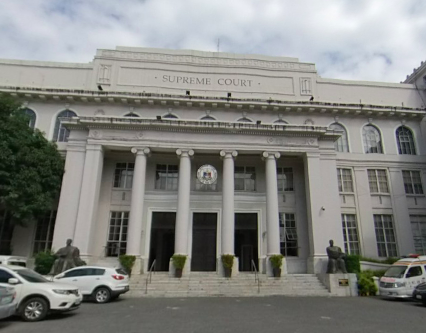SC: Musicians can collect royalty for radio play in commercial sites

Screenshot of the Supreme Court main building
In a legal victory for the country’s music industry and advocates of intellectual property protection, the Supreme Court has ruled in favor of the Filipino Society of Composers, Authors and Publishers Inc. (Filscap), upholding the rights of its members to collect royalties and sue for copyright infringement.
The high court also held that the free use by commercial establishments of radio broadcasts is beyond the normal exploitation of the copyright holder’s creative work.
Filscap is a nonprofit organization that owns public performance rights over its members’ copyrighted musical works. It also owns the right to license public performances of copyrighted foreign musical works of its members and affiliate performing rights societies abroad.
It is deputized to enforce and protect the copyrighted works of its members or affiliates by issuing licenses and collecting royalties, license fees or both from anyone who publicly exhibits or performs music belonging to the organization’s worldwide repertoire.
In a decision penned by Justice Rodil Zalameda, the Supreme Court en banc granted Filscap’s petition that sought to reverse a Court of Appeals (CA) ruling. The CA earlier upheld a decision of the Baguio City Regional Trial Court dismissing a Filscap complaint filed 14 years ago against a restaurant company, Anrey Inc., for copyright infringement.
Anrey, the owner of two Sizzling Plate branches in Baguio City, was sued by Filscap in 2008 for unauthorized public performance of copyrighted music in its business establishments. The company denied the charges, saying its restaurants played whatever was aired on the radio station they were tuned to.
READ: Musicians sign MOA with Baguio hotels, restos on song fees
Performance in itself
In a statement issued on Thursday summarizing its decision, the Supreme Court said it found merit in Filscap’s petition for review. The petitioner, it noted, is accredited by the Intellectual Property Office of the Philippines to perform the role of a collective management organization and is a member of the Paris-based International Confederation of Societies of Authors and Composers, the umbrella organization of all composer societies worldwide.
The tribunal ruled that it was evident that the first element of copyright infringement had been satisfied. Citing United States jurisprudence, it said playing radio broadcasts containing copyrighted music through loudspeakers is, in itself, a performance.
Used for profit
As to Anrey’s argument that it was exempt from securing a license since the radio station that broadcast the music already secured one from Filscap, the tribunal said a radio reception creates a performance separate from the broadcast and that radio reception transmitted through loudspeakers to enhance profit does not constitute, and is not analogous to, fair use.
While Anrey’s restaurants did not directly charge a fee for playing radio broadcasts, such reception was clearly done to enhance profit by providing entertainment to its customers, who pay for the dining experience.
READ: Filipino artists forge pacts to collect copyright dues
According to the court, the denial of Filscap’s petition would affect the copyright holder’s market, wherein instead of paying royalties establishments will instead use free radio reception.
The court ruled that the right of Filscap to license the public performance of copyrighted works, the public performance without a Filscap license, and the refusal of Anrey to pay the license fees were duly established.
Damages
It ordered Anrey to pay Filscap P10,000 as temperate damages for the unlicensed performance of the copyrighted songs, P50,000 in attorney’s fees, plus an interest rate of 12 percent per annum from September 8, 2009, to June 30, 2013, and, thereafter, 6 percent per annum from July 1, 2013, until finality of judgment.
The court also ordered that a copy of its decision be sent to the Intellectual Property Office of the Philippines for its guidance, and to Congress for possible amendments to the Intellectual Property Code without violating the Berne Convention and the Trade-Related Aspects of Intellectual Property Rights (TRIPS) Agreement.
The Berne Convention states that authors of musical works shall enjoy the exclusive right of authorizing the public performance of their works, including the “public performance by any means or process” and “any communication to the public of the performance of the works.”
TRIPS Agreement, meanwhile, incorporates by reference the provisions on copyright from the Berne Convention.
Subject to licensing
According to the Filscap website, those who intend to use copyrighted songs in concerts or events, TV and radio stations, cable TV services, new media (websites, mobile apps, etc.), public transportation, and establishments (hotels, restaurants, casinos, retail shops, shopping malls, cinemas, supermarkets, salons, spas, gyms, music lounges, KTV bars, dance clubs, clinics, office spaces, amusements, music on hold, schools/studios, etc.) should secure a license from the organization.
“Public performance” refers to the playing or singing of copyrighted work, either directly or through any device or process, it stressed.
“In the case of audiovisual works, it is the showing of the images in sequence and the making of the accompanying sound audible to the public. In the case of a sound recording, it is making the recorded sound audible to the public,” it said.
However, the Intellectual Property Code provides exceptions to the rule on prior authorization, like in instances when the public performance is made strictly for a charity or religious institution, if it is made part of reports of current events, or if it is made by the mass media for purposes of information dissemination, among others.
RELATED STORY